|
|
|
Sort Order |
|
|
|
Items / Page
|
|
|
|
|
|
|
| Srl | Item |
| 1 |
ID:
053209
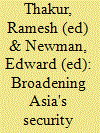

|
|
|
|
|
| Publication |
Tokyo, United Nations University press, 2004.
|
| Description |
xii, 357p.
|
| Standard Number |
9280810944
|
|
|
|
|
|
|
|
|
|
|
|
Copies: C:1/I:0,R:0,Q:0
Circulation
| Accession# | Call# | Current Location | Status | Policy | Location |
| 048480 | 355.03305/THA 048480 | Main | On Shelf | General | |
|
|
|
|
| 2 |
ID:
075153


|
|
|
|
|
| Publication |
New York, United Nations University press, 2006.
|
| Description |
xi, 329p.
|
| Standard Number |
9280811266
|
|
|
|
|
|
|
|
|
|
|
|
Copies: C:1/I:0,R:0,Q:0
Circulation
| Accession# | Call# | Current Location | Status | Policy | Location |
| 051966 | 327.172/NEW 051966 | Main | On Shelf | General | |
|
|
|
|
| 3 |
ID:
103119
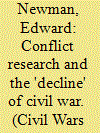

|
|
|
|
|
| Publication |
2009.
|
| Summary/Abstract |
In recent years a number of scholars have suggested that there has been a decline in the absolute numbers of civil wars since the early 1990s, and this claim is purportedly supported by empirical evidence. This paper explores the methodological challenges which confront the study of conflict trends and identifies a number of problems with prevailing approaches. It argues that a differentiated approach to the concept of civil war is necessary before it is possible to make claims about trends in numbers of conflicts, because even the most sophisticated methodological processes have problems related to the manner in which they define and codify armed conflict. Nevertheless, the paper accepts that there has been a decline in the number of major civil wars, and it proposes - and evaluates - a number of explanations for the decline in such wars. These are: the decline of potent ideology since the end of the Cold War, which had hitherto ignited and/or exacerbated armed violence; the decline in intervention by third parties in civil war, a key feature of 'proxy' conflicts during the Cold War; the increasing tendency for secession - or hard partition - to be recognised by the international community, which has defused some ongoing conflicts; the increasingly interventionist nature of peacekeeping and peacebuilding activities by international organisations; the growing tendency for powerful states to view civil war and state failure as a potential security threat, resulting in a more substantial effort to resolve conflict which might have hitherto been regarded as 'merely' a humanitarian issue or even completely ignored; and the growing number of consolidated democracies.
|
|
|
|
|
|
|
|
|
|
|
|
|
|
|
|
| 4 |
ID:
093783
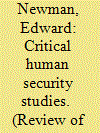

|
|
|
|
|
| Publication |
2010.
|
| Summary/Abstract |
From a critical security studies perspective - and non-traditional security studies more broadly - is the concept of human security something which should be taken seriously? Does human security have anything significant to offer security studies? Both human security and critical security studies challenge the state-centric orthodoxy of conventional international security, based upon military defence of territory against 'external' threats. Both also challenge neorealist scholarship, and involve broadening and deepening the security agenda. Yet critical security studies have not engaged substantively with human security as a distinct approach to non-traditional security. This article explores the relationship between human security and critical security studies and considers why human security arguments - which privilege the individual as the referent of security analysis and seek to directly influence policy in this regard - have not made a significant impact in critical security studies. The article suggests a number of ways in which critical and human security studies might engage. In particular, it suggests that human security scholarship must go beyond its (mostly) uncritical conceptual underpinnings if it is to make a lasting impact upon security studies, and this might be envisioned as Critical Human Security Studies (CHSS).
|
|
|
|
|
|
|
|
|
|
|
|
|
|
|
|
| 5 |
ID:
160887
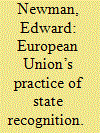

|
|
|
|
|
| Summary/Abstract |
This article explores the European Union’s (EU) practices of international state recognition in a transitional international order. It illustrates the difficulties that the EU has encountered in attempting to reach a collective position on sensitive cases of recognition – through a complex balance of internal and external considerations – at a time when the norms regarding recognition are increasingly under challenge. Whether the organisation takes a collective European position on recognition or allows its members to adopt individual national positions, acute inconsistencies and tensions have been exposed, with implications for the EU’s standing in the world. Through this, the article identifies a key tension between the EU’s normative commitments and its geopolitical interests. In conclusion, the article argues that while a uniform EU policy on recognition may not be feasible and case-by-case pragmatism will likely continue, a more coherent approach and greater understanding of the impact of the EU’s position on recognition are necessary. The article draws upon interview material and extensive analysis of official EU documentation in order to provide new insights into this complex challenge. By exploring the intricacies of recognition politics, the article also makes an empirical contribution to understanding the practice of international relations in this area.
|
|
|
|
|
|
|
|
|
|
|
|
|
|
|
|
| 6 |
ID:
075028
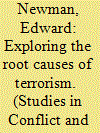

|
|
|
|
|
| Publication |
2006.
|
| Summary/Abstract |
This article attempts to clarify what is meant by "root causes" and considers if their analysis helps to explain and describe how, where, and why terrorism occurs. In attempting to explore-but not definitively resolve-these challenges, the article will attempt to delineate "root causes" into qualitative and quantitative variables that can be empirically tested in relation to contemporary terrorist activity. In so doing, it considers the relative merits of different methodologies for approaching "root causes." The article concludes that indirect and underlying sources of conflict are significant to understanding specific incidents of terrorism and certain categories of terrorism; that "root causes" are less helpful in describing and explaining terrorism as a general phenomenon; and that root causes are of analytical use only in conjunction with precipitant factors.
|
|
|
|
|
|
|
|
|
|
|
|
|
|
|
|
| 7 |
ID:
179554
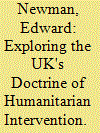

|
|
|
|
|
| Summary/Abstract |
UK governments have often claimed that humanitarian intervention – without the consent of the target state and if necessary without express UN Security Council authorization – is legally permissible in exceptional circumstances, a stance that is highly controversial. The UK’s position is at odds with prevailing international legal doctrine, which is counterintuitive for a country that is generally committed to international law, the UN framework, and multilateralism. It is also in tension with normative developments related to human protection, such as the international ‘Responsibility to Protect’ principle, which established that coercive responses to human suffering must be authorized by the UN Security Council. This article explores the background to the UK’s position on humanitarian intervention, and it argues that this reflects an element of continuity in the UK’s foreign policy in historical perspective, as a legacy of global engagement and a sense of moral righteousness and duty. The article also considers whether the UK’s position may be contributing to an evolution of the norms governing the use of force for human protection.
|
|
|
|
|
|
|
|
|
|
|
|
|
|
|
|
| 8 |
ID:
092480
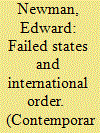

|
|
|
|
|
| Publication |
2009.
|
| Summary/Abstract |
What is meant by failed states in debates about international order, security and threats to security? Does the concept of failed states, as constructed through academic and policy discourse, undermine the ontological assumptions of international order premised upon bounded, viable, rational states?
|
|
|
|
|
|
|
|
|
|
|
|
|
|
|
|
| 9 |
ID:
189375
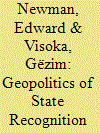

|
|
|
|
|
| Summary/Abstract |
This article explores how the geopolitical rivalries and tensions associated with multipolarity in a transitional international order, driven by shifts in great power influence, are shaping the international politics of state recognition. It considers the diplomatic discourse and practices of traditional great powers and resurgent states in relation to a number of controversial cases of territories seeking independent statehood and recognition. Although contested claims for sovereign statehood and recognition predate the current great power constellation, we find that contemporary state recognition practices offer dominant powers grounds for normative and geopolitical contestation with their rivals. Whilst this is a reflection of the historical continuities of great power politics, the article shows that the transitional international order, and the friction this generates, has further fragmented the norms and practices of state recognition. At the same time, there has not been a broad upheaval in the politics of state recognition because most states maintain a conservative attitude to state creation. The article contributes to contemporary debates on statehood and recognition by revealing how the political and normative friction associated with the changing international order make the possibility of a rigorous, rules-based regime for regulating international recognition more remote than ever.
|
|
|
|
|
|
|
|
|
|
|
|
|
|
|
|
| 10 |
ID:
108109
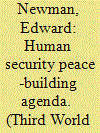

|
|
|
|
|
| Publication |
2011.
|
| Summary/Abstract |
International peace building in post-conflict societies has helped to bring armed conflicts to an end and reduced the recurrence of war. According to some scholars, peace building has therefore contributed to the apparent downward trend of major intra-state conflict in recent years. However, the liberal institutionalist values which underpin international peace building-emphasising democracy, free market economics and the liberal state-have raised a range of criticisms and challenges from scholars as well as local stakeholders in the societies in which peace-building programmes are deployed. In particular, the prevailing approaches to peace-building give insufficient attention to basic and everyday human needs, and promote externally conceived models of state institutions which are not always appropriate. This article explores the problems of contemporary peace building and argues that an alternative vision which draws upon the concept of human security and gives greater emphasis to welfare, livelihoods and local engagement can make peace building more legitimate and sustainable.
|
|
|
|
|
|
|
|
|
|
|
|
|
|
|
|
| 11 |
ID:
172051


|
|
|
|
|
| Summary/Abstract |
This article presents new, original data on food riots and protests between 2005 and 2015 and explores the societal conditions in which these events occurred. These conditions include a range of economic, social, demographic, political, and household consumption factors, with reference to a number of conflict theories. The article explores whether instability related to food prices should be seen as an expression of hunger within the most vulnerable and deprived societies, or a demonstration of grievances rooted in broader political contestation. The article also contributes to debates about the methodological challenges of focusing on food prices as a factor relevant to instability and conflict, and the question of whether food riots have significance to broader debates about conflict.
|
|
|
|
|
|
|
|
|
|
|
|
|
|
|
|
| 12 |
ID:
179953
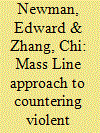

|
|
|
|
|
| Summary/Abstract |
As a strategy to temper centralized governance with a degree of public participation in China, the “Mass Line” approach has been used throughout the history of the Chinese Communist Party (CCP) to mobilize citizens in support of national projects and use this engagement as a channel for feedback. The Mass Line has been employed in attempts to address “radicalization” and challenges to centralized state control, indicating that the CCP’s approach to counter-terrorism goes beyond the top-down, oppressive tactics that China is often associated with. This paper explores China’s programmes of mass mobilization as a part of its counter-radicalization strategy in order to deepen understanding of how the country is responding to a key security challenge. It demonstrates that this approach reflects significant historical continuities, and thus national characteristics, in terms of political culture and state control.
|
|
|
|
|
|
|
|
|
|
|
|
|
|
|
|
| 13 |
ID:
091666
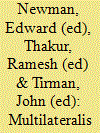

|
|
|
|
|
| Publication |
Tokyo, United Nations University press, 2009.
|
| Description |
xiii, 563p.
|
| Standard Number |
9788171886722
|
|
|
|
|
|
|
|
|
|
|
|
Copies: C:1/I:0,R:0,Q:0
Circulation
| Accession# | Call# | Current Location | Status | Policy | Location |
| 054511 | 327.101/NEW 054511 | Main | On Shelf | General | |
|
|
|
|
| 14 |
ID:
052815
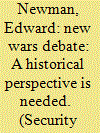

|
|
|
| 15 |
ID:
104907
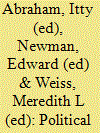

|
|
|
|
|
| Publication |
Tokyo, United Nations University press, 2010.
|
| Description |
xi, 224p.
|
| Standard Number |
9789280811902
|
|
|
|
|
|
|
|
|
|
|
|
Copies: C:1/I:0,R:0,Q:0
Circulation
| Accession# | Call# | Current Location | Status | Policy | Location |
| 056128 | 303.60954/ABR 056128 | Main | On Shelf | General | |
|
|
|
|
| 16 |
ID:
158644
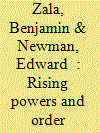

|
|
|
|
|
| Summary/Abstract |
A central theme of the literature on rising powers is that new aspirants to great power status pose a challenge to the underlying principles and norms that underpin the existing, Western-led order. However, in much of the literature, the nature and significance of rising powers for international order are imprecisely debated, in particular the concept and practice of ‘contestation’. In this article, we aim to establish a distinction between normative contestation and what can be thought of as ‘contestation over representation’: that is, contestation over who is setting and overseeing the rules of the game rather than the content of the rules themselves and the kind of order that they underpin. The paper engages with debates on international order and international society, and its empirical basis is provided by a thorough analysis of the discourse of rising power summitry.
|
|
|
|
|
|
|
|
|
|
|
|
|
|
|
|
| 17 |
ID:
087325
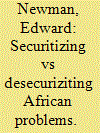

|
|
|
|
|
| Publication |
2009.
|
| Summary/Abstract |
The establishment of AFRICOM does represent a new US strategic focus upon Africa which reflects changing perception of the nature of international threats to security.
|
|
|
|
|
|
|
|
|
|
|
|
|
|
|
|
| 18 |
ID:
074318
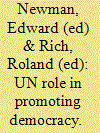

|
|
|
|
|
| Publication |
Tokyo, United Nations University press, 2006.
|
| Description |
ix, 357p.
|
| Standard Number |
8188689661
|
|
|
|
|
|
|
|
|
|
|
|
Copies: C:1/I:0,R:0,Q:0
Circulation
| Accession# | Call# | Current Location | Status | Policy | Location |
| 051826 | 321.8/NEW 051826 | Main | On Shelf | General | |
|
|
|
|
| 19 |
ID:
080365
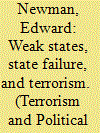

|
|
|
|
|
| Publication |
2007.
|
| Summary/Abstract |
It is common to hear the assertion that weak or failed states are fertile ground for terrorism. Yet terrorist groups have emerged from, and operated within, countries which have strong, stable states and a variety of systems of government. Terrorist organizations operate in weak and failed states but it is not necessarily the condition of weak or failed statehood which explains their presence. Moreover, it is not necessarily the weakest states which do host such groups. Therefore, this condition is not a sufficient explanation for their presence. While weak or failed states might provide an enabling environment for certain types of terrorist groups to operate, additional explanatory variables need to be identified
|
|
|
|
|
|
|
|
|
|
|
|
|
|
|
|
|
|
|
|
|